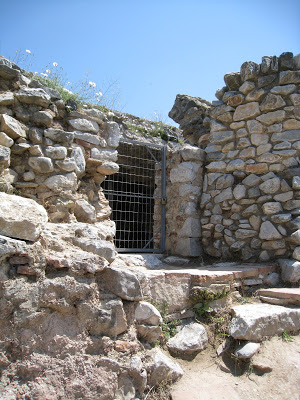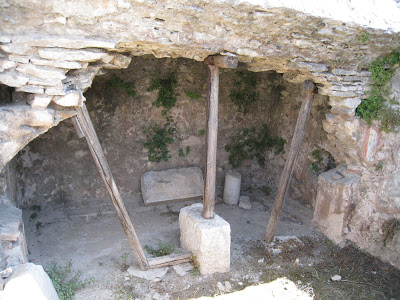According to tradition, the following photos depict the location of the prison cell where Paul and Silas spent the night. However, this tradition has been disputed, and this exact location is archaeologically unlikely to be Paul's prison.
This subsequently led to Paul proclaiming "the word of the Lord" to the jailer and his entire household, resulting in their conversion.
Paul's Macedonian call - the visit to Philippi - Lydia's Conversion - the slave girl's exorcism - accusation by the owners of the slave girl - persecution, suffering and imprisonment - conversion of jailer and his household.
Perhaps some questions could be raised: Is suffering really necessary for Paul in order for the jailer and his household to hear "the word of the Lord" (Acts 16:32)? Without Paul being flogged, humiliated (in which Paul gave up his rights as a Roman citizen where he was thrown in prison without trial, cf. Acts 16:37 - of course, the issue of Paul's Roman citizenship is disputed, but this is a topic for another post), and imprisoned, would the jailer have been persuaded to become believers of the Way? Is suffering therefore a necessity for the propagation of the gospel? Is suffering intrinsic to Paul's call? I have attempted to answer some of these questions in one of my publications.
Paul is no stranger to suffering and imprisonment (cf. 2 Cor 11:23). In fact, he wrote the letter to the Philippians from prison. Would Paul have remembered his chains and the conversion of the jailer in Philippi when he penned these words?
"Now I want you to know, brothers, that what has happened to me has really served to advance the gospel. As a result, it has become clear throughout the whole palace guard and to everyone else that I am in chains for Christ. Because of my chains, most of the brothers in the Lord have been encouraged to speak the word of God more courageously and fearlessly." (Phil 1:12-14)
"For it has been granted to you on behalf of Christ not only to believe on him, but also to suffer for him, since you are going through the same struggle you saw I had, and now hear that I still have." (Phil 1:29-30)
Paul's chains in Philippi is a timely reminder for believers of the gospel he proclaimed. Missionary work in proclaiming THE way to salvation in 1st century is risky business, it is not any less risky for those engaging in the same vocation today.


 RSS Feed
RSS Feed